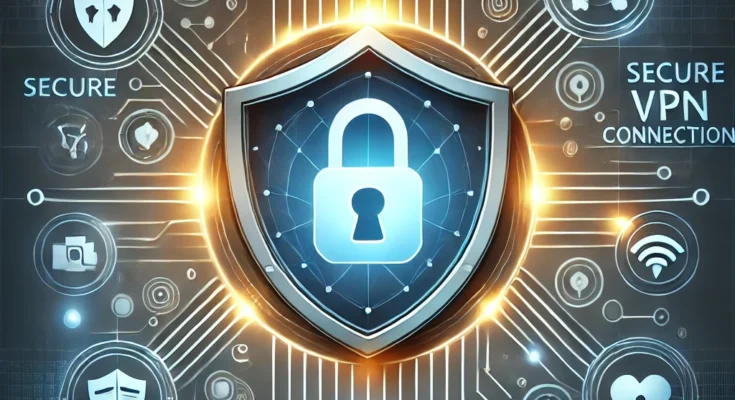Ten Points to Think About to Secure Your VPN Connection
You are confident that maintaining your VPN connection is essential in modern surroundings. You should have a complete information to secure your VPN connection. VPN is a tool to ensure personal network communication over the Internet and can be considered an effective way to boost online anonymity. It conceals your IP and connects to websites using encryption, and it also protects critical information. But that’s where the issue arises: a VPN is not enough if you don’t take additional measures for protection.
In this article, I will focus on the basic methods that might enhance the security of the connection via VPN. Those who are just starting should understand and implement these practices to prevent or reduce online risk factors, and everyone, regardless of their level of experience or security, can gain from reviewing these tips.
You can download a free VPN from the following link.
Free Download: Download Now
Why Securing Your VPN Connection Matters
A VPN protects your data from hackers, spies, and even internet service providers. However, an unsecured VPN means it exposes your network. Another way through which cyber criminals invade your network is when the connections are poor, the software is outdated, or the configurations are faulty.
Now, let’s dig into the best practices for how you can make your VPN connection more secure and almost invulnerable.
- Pick the exemplary VPN service to Secure Your VPN Connection
First, choose a VPN service that you can trust. Not all VPNs offer the same level of protection. There are three essential features to look for in a VPN: military-grade encryption, a kill switch, and a no-logs policy. It’s important to select a provider whose quality and capabilities align with your needs, based on feedback from other users.
Keep in mind that free VPNs often generate revenue by selling user information, which can compromise your privacy. An insecure VPN can expose you to attacks, as cybercriminals may exploit weak connections, outdated software, or incorrect settings.
Let’s explore how to strengthen and secure your VPN connection.
2. Pick a VPN service you can trust
First, choose a VPN service you can trust. Any VPN will give you a different amount of security.
- Look for things like a kill switch, military-grade encryption, and a policy that doesn’t keep any logs.
- Pick a service company with a good name and lots of good reviews.
- Stay away from free VPNs because they often sell your information, which isn’t safe.
Picking a dependable VPN service is the most important thing you can do to make sure your connection is safe.
3. Passwords must be strong and unique to secure your VPN connection
It basically means that your VPN login information needs to be safe. Attackers only need a simple or old password to get into your account.
- Use multiple letters, numbers, and other symbols to make a long password.
- Use a password manager to keep track of all your passwords in a way that looks like a database. They need to feel safe. Bad passwords or passwords that you’ve used before make it easy for hackers to get into your account.
- Make your password long and use a mix of letters, numbers, and symbols.
- Keep track of and keep your passwords with a password manager.
If you want to add another layer of protection, change the passwords often.
4. Make multifactor login work.
Using multifactor authentication (MFA) significantly enhances the security of your VPN account. If a malicious third party were to obtain your login details, they would still be unable to access your account without the second form of identification.
Most VPN providers now offer the option to receive one-time passwords (MFA) via text message or through an app like Google Authenticator.
Enabling multifactor authentication can improve the security of site-to-site VPN connections within your network. This is particularly important if you have created your account using easily guessable passwords or usernames that match those you use on other websites.
For better security, ensure that your password is long and complex, incorporating a mix of letters, numbers, and special characters such as ‘#’, ‘@’, and ‘*’.
Keep track of and keep your passwords with a password manager.
5. Make sure you update your VPN software to secure your VPN connection.
Any VPN software that is not up-to-date is liable to attack. Software developers make releases to eliminate defects, correct vulnerabilities, and upgrade the functioning.
- Look at the new updates in your VPN app or client and try to use the latest versions.
- Turn on the automatic update on the device if there is any. VPN software is vulnerable to attacks. Developers release updates to fix bugs, patch security holes, and improve performance.
- Regularly check for updates in your VPN app or client.
- Enable automatic updates if available.
Updating software ensures that the VPN is using the latest security protocols.
6. Use advanced encryption protocols.
The most significant function of a VPN is encryption. Go for the VPN protocols that possess the best kind of security features.
- Choose between Open VPN and Wire Guard since they boast a high degree of security and efficient performance levels.
- Avoid older methods like PPTP as they are easily hackable and do not provide the highest level of encryption.
- Opt for OpenVPN or WireGuard, which are known for their robust security and performance.
- Avoid outdated protocols like PPTP, which are easier to crack and secure your VPN connection.
By implementing high levels of security, you can be confident that an unauthorized third party won’t access your information during the transfer.
7. Enable a Kill Switch
Everyone who uses a VPN needs a kill switch. When your VPN connection drops, this feature will automatically cut off your internet access. • You may lose your IP address because there is no kill switch, as we’ve seen. The best thing about paid VPN services is that most of them have a kill switch option. If the VPN disconnects unexpectedly, it cuts off your internet connection.
- Your actual IP address might become visible without a kill switch.
- Most premium VPNs have a built-in kill switch to help secure your VPN connection.
Use this feature in your VPN settings for a smooth experience and continuous security.
8. Avoid public Wi-Fi without extra precautions.
The issue lies in the high vulnerability of public Wi-Fi networks to various hacker attacks.
- Ensure you log into the network through the VPN.
- Do not make use of any account that needs a password or perform any online transaction.
- We recommend using a firewall and an antivirus as protection measures. Use public Wi-Fi; take these precautions:
- Connect to your VPN before accessing the network.
- Avoid logging into sensitive accounts or making online transactions.
- Use a firewall and antivirus software for added protection.
Social networks can be dangerous, but a safe VPN reduces the risks.
9. Test Your VPN Connection
Check that your VPN is satisfactory. Conduct tests to verify if there are any leaks or vulnerabilities that could attract attackers.
- There are ways of checking your security, such as DNS leak testers and IP address checkup programs.
- If you detect any of them, you should contact the appropriate VPN service providers for assistance or vulnerabilities.
10. Disconnect when not in use.
Leaving the VPN on all the time, even when not in use, can be dangerous as it exposes the device to unnecessary risks.
- Turn off your VPN whenever you are offline or whenever you have done your surfing for the day.
- Reconnect only with secured networks. Expose your device to unnecessary risks.
- Disconnect your VPN when you’re offline or finished browsing.
- Only connect to trusted networks when reconnecting.
Such small practices can be very effective in keeping away any harm that you face.
11. Educate Yourself on VPN Security
Keeping yourself informed is the only way to defend against these threats. This article provides information about the proper use of VPNs and new threats on the Internet.
- Stay subscribed to cyberspace posts by cyber security experts.
- Follow the new changes with the provider of your VPN service.
Education is vital when it comes to your VPN connection security.
also read about: Top 8 AI Tools for Video Editing in 2024
Final Thoughts
It is essential to encrypt your VPN connection in order to have safe and private browsing. You can minimize nearly all risks by selecting the proper provider, using excellent passwords, and utilizing sophisticated options like MFA and kill switches.
Follow the actions listed in this article and add “secure your VPN connection” to your list of crucial activities. While securing your internet activity doesn’t have to be a complex process, it is a process that requires regular attention and practice.
Be safe and protected whenever you need to be online.


One Comment on “Ten Points to Think About to Secure Your VPN Connection”
Comments are closed.